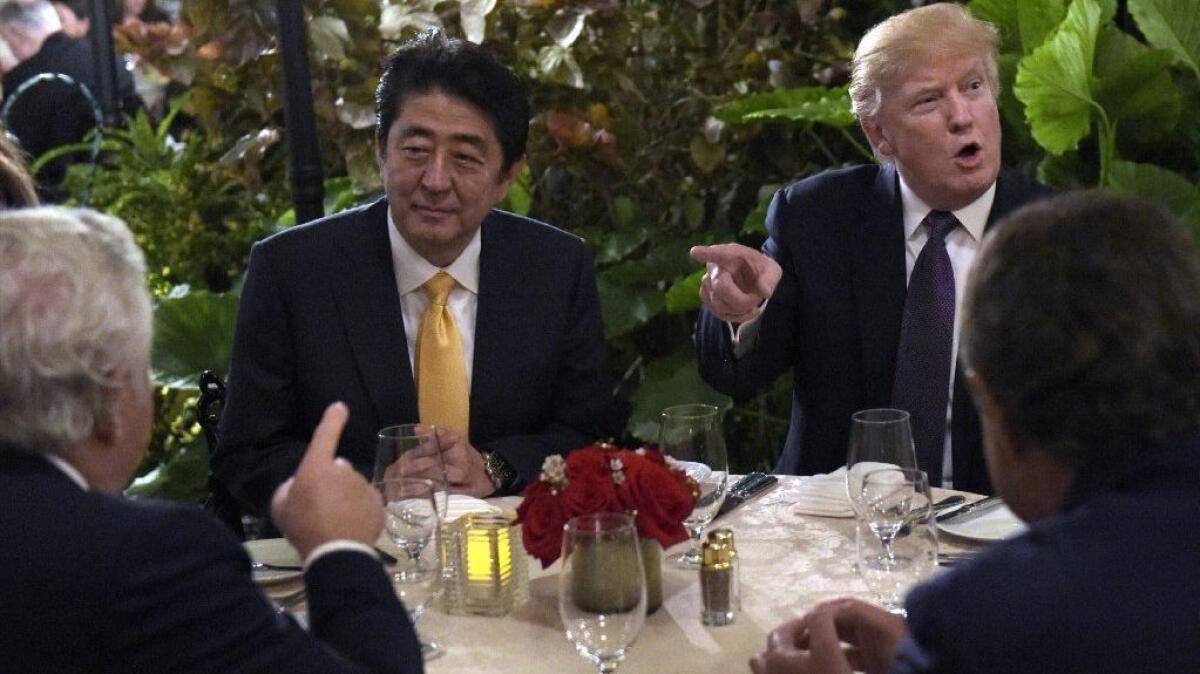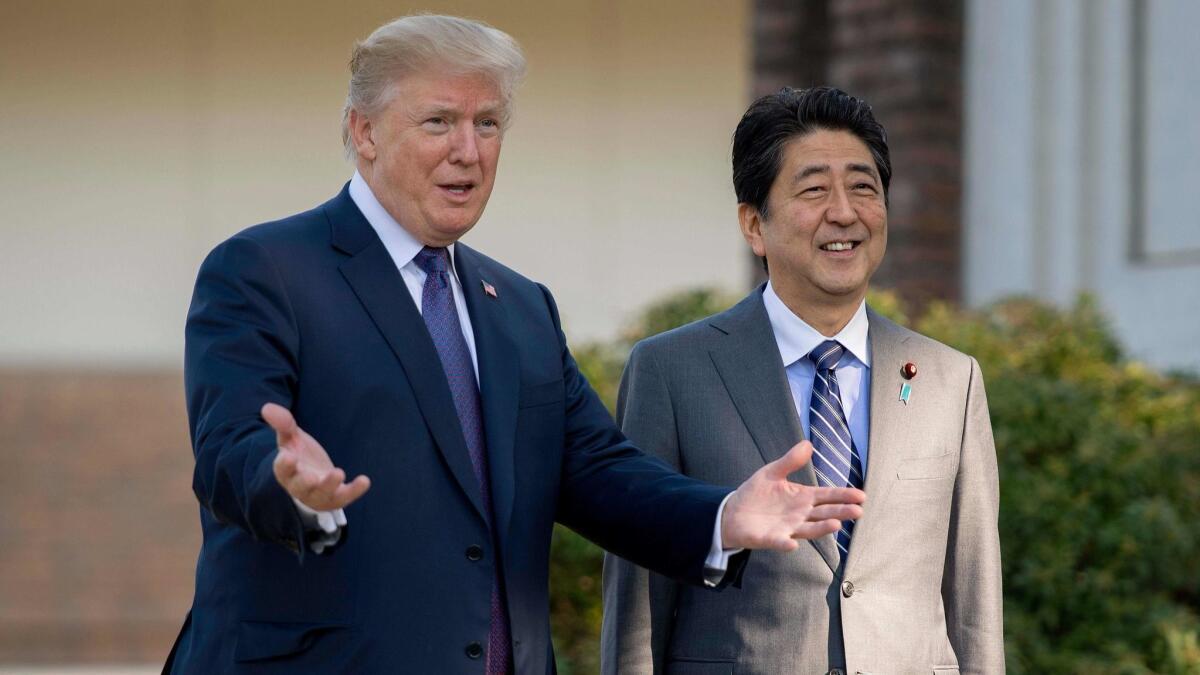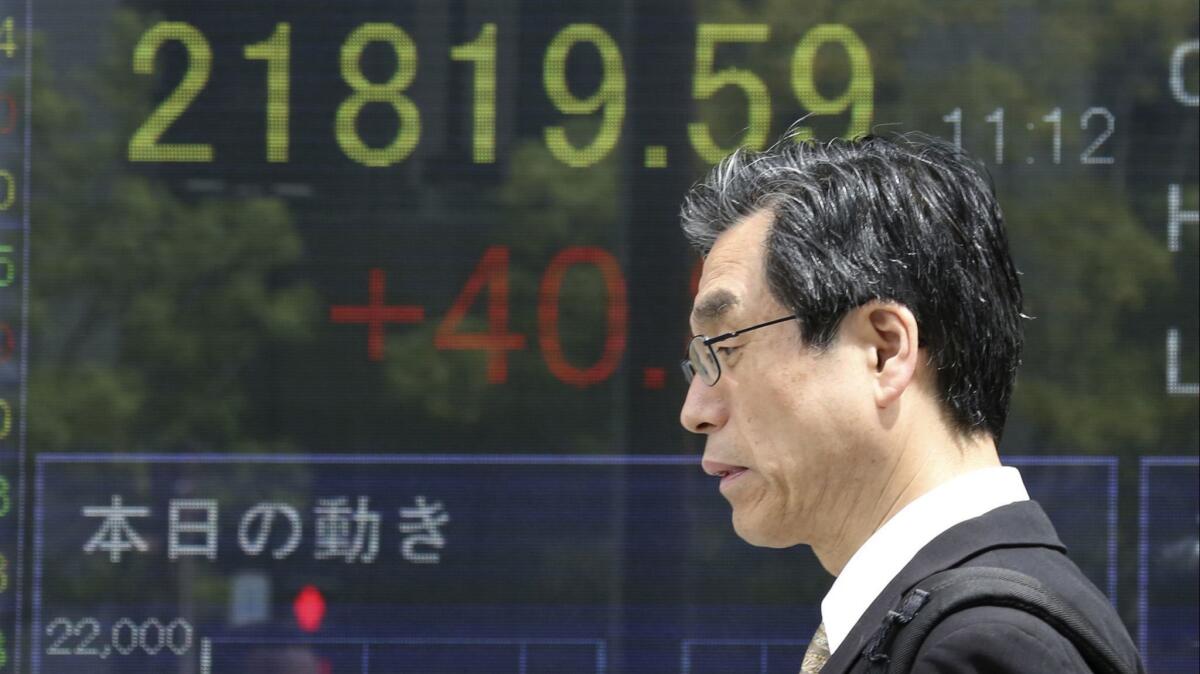Snubbed by Trump, Japanese leader returns for summit at Mar-a-Lago

Reporting from Washington — Barely two weeks after Donald Trump was elected, Shinzo Abe rushed to Trump Tower to meet America’s new leader in a cordial 90-minute visit.
The Japanese prime minister was also the first foreign leader invited to Mar-a-Lago, Trump’s resort in Palm Beach, Fla. And the relationship blossomed further when the president made Japan the first stop in his Asia trip last fall — a visit featuring golf, burgers and matching baseball caps emblazoned with “Donald & Shinzo: Make Alliance Even Greater.”
But despite those promising beginnings, Abe’s view of Trump has suddenly veered to alarm.
Tokyo was dismayed last month when Trump suddenly announced he would meet with Kim Jong Un, the North Korean despot. There had been nary a word of warning, much less consultation, for America’s closest friend in the western Pacific.
Adding insult to injury, later the same month, Japan was the only major American ally not promised an exemption from Trump’s hefty new tariffs imposed on steel and aluminum.
“I think the Japanese thought that Abe kind of knew how to handle Trump. That was his big mistake,” said Clyde Prestowitz, a top trade negotiator in the Reagan administration and expert on East Asian economics.
Now, chastened and anxious, Abe will return to Mar-a-Lago on Tuesday for a crucial summit with Trump.
The focus will be on North Korea and its nuclear weapons program — an issue vastly more urgent for Tokyo than for Washington. Although Kim may have nuclear missiles capable of hitting the West Coast of the United States, North Korea has already demonstrated many times over than it can rain ballistic horror on Japan any time it chooses.
Whether the return to Mar-a-Lago includes a round of golf, the atmosphere will be far more tense for Abe than it was on his first visit.
It isn’t just that both men are weighed down by political troubles at home — Abe from a land-sale scandal and Trump by a persistent investigation involving Russia and his sexual indulgences.
But on the larger global stage, the two leaders are confronting possibly unprecedented events that could create seismic shifts in the Pacific region.

Although most analysts say the U.S.-Japan alliance established after World War II remains fundamentally sound, Trump’s unilateral, spontaneous and unpredictable pronouncements and approaches to policymaking have raised deep-seated concerns about the future of East Asia.
And for the Japanese people, the possibility that they could no longer rely on the protective umbrella of U.S. military power may be the most unsettling development in their postwar history.
Since Kim assumed power in 2012, Pyongyang has conducted 99 missile tests, including 11 successful launches last year, five of which fell within 200 nautical miles of the Japanese islands, according to Sheila Smith, a senior fellow for Japan studies at the Council on Foreign Relations. One of those tests came when Abe and Trump were dining at their first Mar-a-Lago summit.
Kim has claimed his ballistic missiles could eventually reach the United States.
Trump’s attitude toward Kim, however, has vacillated from suggesting he would welcome the North Korean ruler for “a hamburger on a conference table” to ridiculing him as “little rocket man,” and threatening to meet Kim’s bellicose talk against the United States “with fire and fury.”
This month, Trump said his administration has been in touch with North Korean officials. “We’ll be meeting with them sometime in May or early June, and I think there will be great respect paid by both parties,” he told reporters at a Cabinet meeting.
What worries Abe, as well as the Japanese people and the larger foreign relations community, is that Trump, in his desire to broker a deal breaking through a long stalemate, will settle for something that could leave the region vulnerable, and no one more so than Japan.
Kim could propose a deal in which the United States curtails regional military exercises in exchange for a North Korean freeze on its testing of ballistic missiles and nuclear weapons.
The freeze-for-freeze idea has been floated by China and Russia before, but is highly unpopular in Japan as well as with conservatives in South Korea, said Michael J. Green, senior vice president and Japan chair at the Center for Strategic and International Studies.
Critics of the idea say it would be an empty promise enabling Pyongyang to continue developing its nuclear capabilities in secret while the United States stood down militarily.
“When North Korea says denuclearization of the Korean peninsula, they mean the U.S. goes first,” Green said. “You guarantee the survival of our regime, which means you pull back your troops, your sanctions.
“It’s basically meaningless. The North Koreans have used this phrase repeatedly over the past two decades.”
Analysts expect Abe will have at least two major asks of Trump on North Korea: The first is that the president raise the issue of Pyongyang’s abduction of Japanese citizens, a particularly sensitive matter in Japan. Tokyo has made little progress negotiating for the return of more than a dozen citizens who were kidnapped by North Korean agents during the 1970s and 1980s.
The second could be harder to attain: a statement from Trump that there will be no relaxation of pressure on North Korea, or any change in the American-led military readiness or exercises, until Pyongyang takes concrete, verifiable steps to denuclearize.
But even a commitment from Trump that he will demand a total dismantling of North Korea’s nuclear program may not be enough to reassure the Japanese.
“Trump has been volatile on many issues; that’s what many people worry about,” said Takeo Hoshi, director of the Japan program at Stanford’s Shorenstein Asia-Pacific Research Center. “If he meets directly with Kim Jong Un, he might say something he shouldn’t, or something spontaneously.”

Then there’s the matter of trade.
Although the president has reserved his harshest words and actions for China, including threats to impose tariffs on as much as $150 billion of Chinese goods, Trump many years earlier had voiced similar disdain for Japan’s trade and economic policies, something that surfaced during the 2016 presidential campaign.
Many experts think Trump snubbed Japan on metal tariff exemptions to exert leverage on Tokyo to cut a trade deal. “The U.S. wants Japan to complain about the tariff and then wants to talk about a bilateral treaty,” said Hajime Izumi, professor of international relations at Tokyo International University.
Abe will be reluctant to commit to launching two-way trade negotiations, knowing that Trump officials will insist on substantial market openings, especially in agriculture, said Mireya Solis, a Japan scholar at the Brookings Institution. As much as Abe would like to get an exemption on metal tariffs, the political cost of caving in to Trump’s pressure for a trade deal may be far greater for the prime minister.
Their summit discussions on trade will be further complicated by Trump’s impromptu remarks on Thursday that he is considering rejoining the Trans-Pacific Partnership, a sweeping trade pact that the Obama administration negotiated with Japan and 10 other nations.
Trump trashed the deal during the campaign as bad for America, and the president pulled the United States out of it shortly after he took office. But now he is weighing whether the TPP, as it’s known, might be useful after all, as a multilateral pact could help Trump align allies in his brewing trade war with Beijing. The agreement does not include China.
Japan and 10 other nations signed the deal last month without the United States. Now that Trump is open to reversing his position on the TPP, it could help Abe make the case that Japan too has been hurt by Chinese technology-transfer and market-distorting policies and that Tokyo and Washington have a common interest in going after Beijing’s mercantilist behavior.
In theory, that deepening skepticism of China in the U.S. government, as well as in businesses and think tanks, should give Abe and Japan the basis to build a more robust alliance with their American ally. But Trump’s trade and foreign policy moves have been unpredictable. On Thursday night, the president suggested he would push for two-way trade talks with Tokyo, tweeting that Japan “has hit us hard on trade for years!”
“The Japanese are generally confident about the relationship, but Donald Trump creates all this uncertainty,” Green said. “And they could see a scenario where all of a sudden, he tweets: ‘Huge victory with Kim Jong Un, and we’re going to stop military exercises.’”
Green added: “Abe needs a good summit, but the bigger risk for him is the actual summit with Kim Jong Un. Because the president may agree to something with Abe, but then change his mind. That will undermine Japan’s security. And all of his close relations with Trump didn’t pay off at all.”
Special correspondent Yuri Nagano in Tokyo contributed to this report.
Twitter: @dleelatimes
More to Read
Get the L.A. Times Politics newsletter
Deeply reported insights into legislation, politics and policy from Sacramento, Washington and beyond. In your inbox three times per week.
You may occasionally receive promotional content from the Los Angeles Times.











